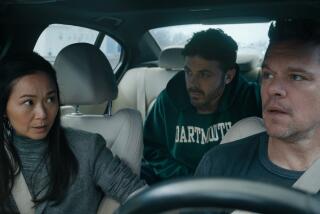‘The Imposter’ studies deceiver and deceived
- Share via
Nicholas Barclay, a 13-year-old from San Antonio, had been missing for more than three years when he seemed to miraculously resurface in the custody of authorities in Spain in 1997.
The Barclay family accepted him back into their home, even though this Nicholas looked little like the boy they had known and that he now spoke English with a heavy accent.
Months later they discovered the person living with them was actually a 23-year-old France-born man named Frédéric Bourdin, who had spun an elaborate deception to pose as Nicholas. Bourdin eventually served six years in a U.S. prison for perjury and fraudulently obtaining a passport. The whereabouts of Nicholas Barclay are unknown.
The new documentary”The Imposter,” which opened Friday in Los Angeles, chronicles this true crime story, a drama that plays more like a fantastical fiction and marks the feature debut of London-based director Bart Layton.
“I was really drawn in by this idea: What kind of human being would be capable of committing a crime like this?” Layton, 37, said by phone just before the film’s European premiere at the Edinburgh International Film Festival. “And then the next set of questions is what kind of family would be capable of falling victim to that?”
Layton, a veteran maker of documentaries for British and American television, first learned of the Barclay-Bourdin saga from a 2009 story in a Spanish magazine. He flew Bourdin to London for a two-day interview, then gained the cooperation of the Barclay family in Texas and set out to piece together the puzzle of how a family could mistake a stranger for their missing son.
“The Imposter” interweaves Bourdin’s interview with the recollections of Nicholas Barclay’s mother, his adult sister and other family members as well as an FBI agent who investigated the case, the former U.S. consul in Madrid who issued Bourdin a passport as Barclay and a colorful private investigator named Charlie Parker.
The film takes more than one startling turn, and Layton also layers in dramatic fictional visualizations of Bourdin’s astonishing tales — using production talents involved in such films as”No Country for Old Men”and “Broken Embraces” to give the imagery a sleek, stylized look. Included as well is the Barclays’ home video footage of the moment they met Bourdin and brought him into their family.
“What this film is about fundamentally is competing accounts of the same events,” said producer Dimitri Doganis. “So instead of a documentary where you are telling a story which is as close to the truth as you can get, here what we’re saying is, ‘We don’t know if this is true.’”
“It’s not just about finding one neat version of the truth where you provide all the answers,” Layton added. “Actually the process of the making of the documentary throws up all these different versions of the truth. Can you allow the audience to have a direct experience of that and navigate their own way through it?”
Bourdin, who now lives in France with a wife and family, has talked about the documentary on social media and even posted his own review of the film on YouTube, in which he declares, “Don’t judge me.... You don’t have to understand what I did; sometimes I don’t understand it myself.”
However, Layton says that Bourdin has not seen the film, though the director has offered to show it to him. “It’s hard to say what he’s upset about and why he wouldn’t want to see the film,” Layton said. “Perhaps it makes it easier to reject it on some level.”
(The Barclay family has not commented publicly on “The Imposter.”)
Perhaps the biggest challenge for the filmmaking team in assembling the footage in the editing room was maintaining a balance between Bourdin’s fabulist persona, the Barclays’ personal pain and some objective notion of the truth.
“You approach them with the relatively simple task of allowing both parties to tell their side of the story in the way they choose,” Layton said. “They both have to be given the opportunity to respond. And that’s what the film does, it doesn’t make judgments for you. Hopefully it gets you in the position of making those judgments yourself.”
“The Imposter” had its world premiere in January at the Sundance Film Festival and earned almost universally positive reviews, nearly all of which commented on the unbelievable nature of the story.
The film made other stops on the festival circuit and in addition to its U.S. release is scheduled to open theatrically in Britain this month.
Layton and Doganis, partners in the production company Raw, have a number of active television projects and a few ideas for feature documentaries, though they declined to elaborate on what might be next for them.
As “The Imposter” has played to audience after audience, though, Layton has been heartened by the response to the film, the willingness of viewers to plug into the at-times inside-out dynamics of the story.
“What’s extraordinary about it is that this happened in the real world, not in a Coen brothers movie,” Layton said.
More to Read
Only good movies
Get the Indie Focus newsletter, Mark Olsen's weekly guide to the world of cinema.
You may occasionally receive promotional content from the Los Angeles Times.











